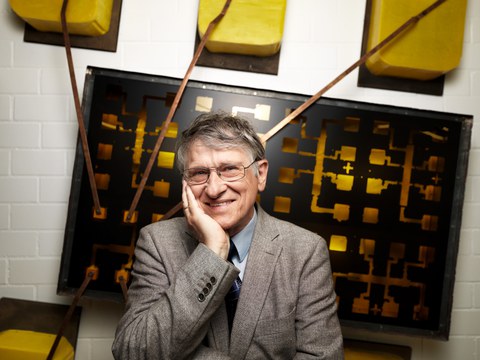Apr 09, 2018
Nobel laureate Klaus von Klitzing on Wednesday, 11th April, in HSZ on quantum physics and the prototype kilogram
In his lecture "Ein neues Kilogramm im nächsten Jahr und was das mit meinem Nobelpreis zu tun hat" („A New Kilogram Next Year and How My Nobel Prize is Concerned with This”, held in German language), Nobel laureate Klaus von Klitzing explains how the quantum Hall effect is related to the prototype kilogram near Paris on Wednesday, 11th April, in the TU Dresden's Hörsaalzentrum.
Trapped light particles, weight-losing kilograms and molecular motors touring through human bodies – these are the research topics built upon in this year’s public lecture series “Nobelpreisträger zu Gast an der TU Dresden” (Nobel laureates visiting TU Dresden). Organized by the TU Dresden School of Science, the event brings Nobel laureates to Dresden for the third year in row. On 11th and 18th April as well as 27th June 2018, three of the Stockholm laureates will share with us their award-winning and current research projects. Along with them comes the spirit of the Nobel Prize!
Klaus von Klitzing, Nobel laureate in Physics, will open the lecture series on 11th April, discussing a kilogram near Paris: Ein neues Kilogramm im nächsten Jahr und was das mit meinem Nobelpreis zu tun hat („A New Kilogram Next Year and How My Nobel Prize is Concerned with This”). The director at the Max Planck Institute for Solid State Research, Stuttgart, won the prize for the discovery of the quantum Hall effect in 1985: classical physics is built upon continuous natural processes, as are observed also in voltage drops and rises; yet, at low temperatures and strong magnetic fields, a Hall voltage appears in current-carrying semiconductors that changes stepwise. But: How does this refer to the prototype kilogram, whose slow decay cannot be stopped even by complex mechanic protection devices in its storage near Paris? Are von Klitzing’s ideas capable of solving the problem of the weight-losing kilogram? Certainly, they will enlighten the audience with brilliant scientific findings on the microcosm.
The public lecture starts at 7 p.m. in the Hörsaalzentrum of TU Dresden. Anyone interested in “Nobel science” is warmly invited to join after registering for the respective events under tu-dresden.de/mn/nobel.

